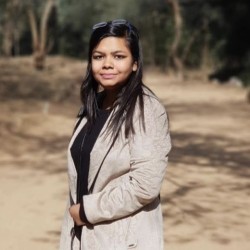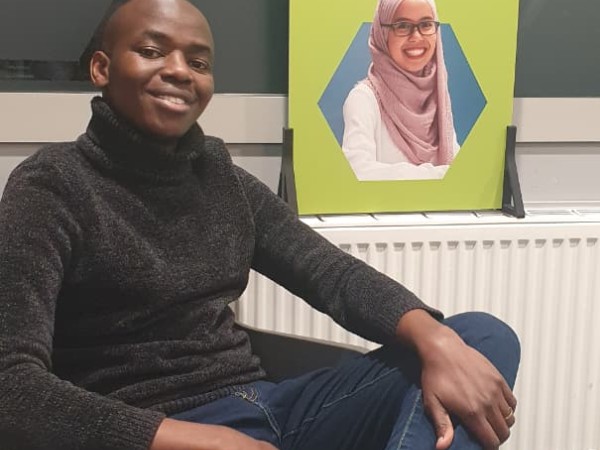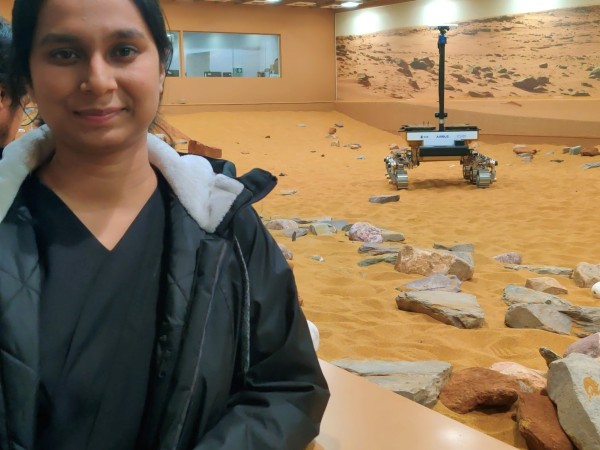
Muskan
"The best aspect of studying at Surrey is the industry relevance. From day one, I felt connected to real-world applications, particularly through the university’s collaborations with top satellite companies."
Why did you choose to study your course at Surrey?
"I was drawn to Surrey because of its unparalleled expertise in satellite communications and the fact that it hosts one of the world’s largest academic research groups in 5G and 6G technologies."
The University’s 5G/6G Innovation Centre really stood out to me. It's a hub for ground-breaking research, not only on mobile networks but also on how satellites are becoming integrated into the next generation of communication systems. Being part of a programme that is actively shaping the future of the digital economy was incredibly appealing.
"The close collaboration with major industry partners like Airbus, SES, and BT/EE meant I would be learning directly from cutting-edge developments, with a clear pathway towards meaningful career opportunities."
What are the best things about Surrey and your course?
The best aspects of Surrey and my course have been the exceptional laboratory facilities and the practical, industry-relevant curriculum. Having access to the RF Lab with network analyzers and satellite link simulators, as well as the Rohde and Schwartz Satellite Networking Laboratory with roof-mounted antennas for live satellite communications, provided invaluable hands-on experience.
The course's close connections with Surrey Satellite Technology Ltd allowed me to bridge theoretical knowledge with practical applications in the industry. I particularly valued working on my dissertation project developing a Ka-band SIW antenna, which gave me specialized expertise in high-frequency communications systems.
Additionally, the opportunity to participate in the UKSEDS Satellite Competition as part of Peryton Space allowed me to apply classroom learning to a real satellite development project.
"Another great aspect is the course's recognition by the Institution of Engineering and Technology (IET), which means it's not just academically rigorous but also professionally valued, giving me a solid start towards becoming a Chartered Engineer."
What are the best things about life here as a postgraduate student?
"Life at Surrey as a postgraduate student is a perfect blend of academic stimulation and personal enrichment. One of the things I’ve enjoyed the most is the strong sense of community."
Surrey attracts people from across the globe, so I’ve been able to build an international network of peers and professionals, which has really broadened my perspective. The campus itself is fantastic, offering state-of-the-art facilities like the 5G/6G Innovation Centre, where I could engage with cutting-edge technology and research. Beyond academics, Surrey’s location is ideal—it offers a peaceful environment but is close enough to London for easy access to professional events, networking opportunities, and a bit of city life when needed. The university’s commitment to student well-being and support, including its career services, has also made my time here truly fulfilling.
What are your career plans?
Having recently completed my internship with Magdrive as a Numerical Physics SPIN Intern, I'm looking to secure a full-time position in satellite communications engineering. I'm particularly interested in roles focusing on RF systems, antenna design, and satellite payload development. My experience with the D.A.R.W.I.N. CubeSat project and my dissertation on Ka-band antenna systems has prepared me for specialized work in satellite subsystem design.
"I aim to contribute to innovations in satellite communication technologies that can improve global connectivity, especially in regions where traditional infrastructure is limited."
Long-term, I aspire to be part of projects advancing satellite integration with 5G/6G networks and developing next-generation satellite communication systems.
What advice do you have for students thinking of doing this course?
If you’re passionate about satellite communications and want to be at the cutting edge of technology, I highly recommend this course. For students considering this course, I'd recommend strengthening your fundamentals in RF engineering and digital communications before starting.
"Make the most of Surrey's excellent laboratory facilities and practical sessions - these hands-on experiences are invaluable for truly understanding satellite communications concepts. Don't hesitate to get involved with student societies like Peryton Space, which provide opportunities to apply your learning to real engineering challenges and projects."
Also, take advantage of Surrey's industry connections through networking events and guest lectures - these relationships can lead to internships and job opportunities. Finally, consider pursuing an amateur radio license as I did; it provides practical insights into radio communications that complement the academic curriculum perfectly.

